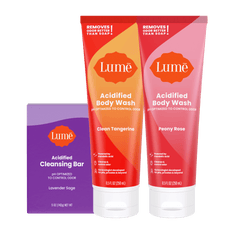
How to Stop the Cycle of Recurring BV Infections Permanently
by Callie Sleper
Living with bacterial vaginosis (BV) for any length of time can feel extremely limiting, and it’s a condition that can keep you from feeling like your best self. Women with a recurring BV diagnosis are especially impacted. No matter what treatments they try, it always comes back with a vengeance that seems beyond explanation and their best efforts.
What you’re not going to hear from mainstream medical sources or the feminine hygiene industry is that most women are led to believe they have BV when, in reality, it’s overdiagnosed most of the time. That’s because the most distressing symptom of BV (fishy odor) also happens as a natural result of everyday living.
And this affects the entire way we look at stopping recurring BV infections permanently.
We’re here with a message that sufferers of recurring BV will find hopeful: There are many things you can do and avoid to prevent and treat what’s actually going on from the comfort of your own home and avoid another misdiagnosis.
Let’s start by looking into why recurring BV is such a serious concern.
WHAT MAKES RECURRING BV SO DISTRESSING?
It’s unclear what causes BV’s bacteria imbalance in the vagina. This makes it harder to avoid, and it’s over 50% likely to return within 12 months of treatment. This can continue for years.
Taking antibiotics for infection can also cause harmful effects when used excessively–a high price to pay for a surprisingly low return.
BV symptoms like vaginal itching, burning, abnormal discharge, pain when urinating, and pain with sex greatly impact women. One of the most distressing symptoms of all is a strong “fishy” odor.
Women with persistent BV constantly worry it will return at any point unannounced, that there’s something wrong with them, or someone will notice their smell.
BV negatively affects women’s sexual intimacy most of all. Women avoid certain sexual acts due to the fear that their partners will judge them or be less attracted to them because of their smell. They may dread cuddling or being in close proximity to anyone who happens to catch their odor whenever they uncross their legs.
Having BV increases the likelihood of getting STIs like herpes, chlamydia, or gonorrhea as well as passing along HIV to your partner if you already have it.
As a result, self-confidence definitely takes a big hit from BV.
THERE’S A GREATER CHANCE BV’S BEEN MISDIAGNOSED THAN YOU MIGHT THINK...
BV is misdiagnosed a whopping 61% of the time. Why? Because the criteria used to determine infection is highly subjective and other natural factors can swing the result towards a positive diagnosis. Learn more about why BV is such an imperfect diagnosis.
Perhaps the biggest reason why the condition is so overdiagnosed is because the same malodor from BV reactions is also caused by regular, external reactions that are noninfectious. In a vaginal infection, bacteria issues from the uterus in an abnormal, internal reaction. Externally, GI tract bacteria close to the vulvar area mixes with fluids produced from normal events like intercourse, periods, or menopause.
Put another way: The odor you get from BV is the exact same as odor that occurs in your vulvar area from day to day activities.
We’re here to bust the myth that the vagina is to blame for all odor below the belt. We promise, it’s not.
WHY THIS MISDIAGNOSIS OF BV IS SO SIGNIFICANT
With the knowledge that most women labeled as BV victims don’t actually have it, what’s to stop you from seeing whether symptoms clear up on their own before setting up that doctor’s appointment?
Just so we’re clear, you can’t treat actual internal BV with anything but antibiotics until the infection clears. But there are things you can do which may help prevent BV.
If your symptoms clear after any of the external remedies listed below, you’ll know the problem was never an internal infection.
11 THINGS YOU CAN DO TO PREVENT INTERNAL BV OR EXTERNAL SYMPTOMS
1. Avoid douching and using perfumed products internally. Potential allergic reactions can cause itching, burning, and even abnormal discharge that mimics infection. Explore more reasons why these products should be avoided at all costs.
2. Do not use home remedies internally. Women try all kinds of interesting things to remedy BV. Symptoms cause such stress that they resort to placing things like apple cider vinegar, garlic, tea tree oil, yogurt, boric acid, and hydrogen peroxide into the vagina in a race for relief. As you can imagine, this is a terrible idea. Please do not do this.
We never recommend using anything internally to clear symptoms. Period. Doing this can exacerbate symptoms, and the products’ effects on vaginal pH is not healthy. It’s normal for the vagina to clean itself. What’s not normal is an infection, and that’s when you need to call your doctor.
External issues are similar. After researching home remedies, you can try applying something like apple cider vinegar on a towel or wipe to the vulva at your own risk. However, many women can’t tolerate these substances down there, not to mention their benefit doesn’t last long anyway.
3. Avoid clothing that’s too tight or holds in heat and moisture down there. Underwear made of man-made materials and thongs of any kind are particularly notorious for promoting the growth of bacteria and yeast. I remember my high school world history teacher told us, “Always white, never tight. Only floss your teeth.” Unforgettable.
So, you’ll want to try sticking with natural fabrics like 100% cotton or wool, or at least undies with natural lining.
Another thing you should avoid is wearing wet bottoms like swimsuits for too long. Gym shorts and leggings– while cute– are also usually non-breathable and made of synthetic fabrics, which accumulate sweat and attract bacteria. Make sure your body and clothes stay as clean and dry as possible.
4. Minimize itching, burning, and irritation from day-to-day causes to rule out infection. Wash the vulvar area with mild soap and water, drying well. You can apply shea butter, clotrimazole, and hydrocortisone two times daily and experiment with a sitz bath or applying a cold or warm compress. If symptoms don’t improve after a few days, see your gynecologist.
5. Maximize sexual safety. Our goal is not to tell anyone what they should do in the bedroom, but from a scientific standpoint, you’re likelier to contract BV with more casual sexual partners. Using a condom is a great way to lessen this likelihood.
6. Cut back on cigarettes. Smoking cigarettes has an anti-estrogenic effect and alters levels of healthy vaginal bacteria, which increases your odds of infection.
7. Take probiotics or eat probiotic-rich foods. Though there’s some debate on their efficacy, most studies support using probiotics to curb BV. Since no adverse effects have been reported, why not see if it helps? Ask your doctor or nutritionist which supplements are most helpful for balancing vaginal microflora.
Yogurt with active cultures may help, as well as fermented foods like kimchi, sauerkraut, miso, fermented veggies, and low sugar kombucha.
8. Practice good hygiene. Always wipe front to back after using the bathroom. Change pads and tampons frequently throughout your period, and clean any sex toys between uses with soap and hot water.
9. Increase your estrogen. Vaginal irritation can occur when estrogen levels are lowered, increasing the risk of infection. For those who’ve experienced estrogen drops due to pregnancy, menopause, certain birth control, or surgical removal of the ovaries, your doctor may prescribe estrogen to help.
10. Groom pubic hair. More hair down there is not a bad thing. Just keep in mind that more hair provides a greater surface area for bacteria to flourish and combine with fluids to create odor.
11. Apply Lume Deodorant For Pits, Privates & Beyond to put an end to embarrassing external odor. As I mentioned earlier, perfectly normal but foul external odor imitates infection, causing a lot of trouble and BV overdiagnosis.
Lume’s founder Dr. Shannon Klingman, OB/GYN, was so passionate about finally solving this burdensome issue for women that she created Lume for just this reason!
Many of Shannon’s patients experienced this frustrating cycle of BV misdiagnosis with no remedy in sight that could ease their suffering. She knew there should be a solution that any woman could try easily at home and end the cycle of over-diagnosis through education and empowerment.
Lume keeps bacteria from reacting with common bodily fluids to cause odor. Because Lume is a water-based cream, it is easy to use and its effects are powerful and safe for use anywhere on your external body.
If odor is your main symptom, try Lume externally below the belt for a couple days. If the smell persists or you experience any of these other signs of internal infection, make an appointment with your doctor to rule out infection. If the odor goes away, you’ll know it is just external day-to-day odor.
Finally, a simple solution for concerning external odor.
Enjoy Lume’s long-lasting odor control for improved confidence and break the cycle of misleading BV diagnosis.
Our hope is for women everywhere to LOVE and EMBRACE their vaginas and feel extraordinarily empowered in their bodies. You should feel free to live your best life without reservations.
***Disclaimer: Information in this article is not intended to replace professional diagnosis or treatment. Lume imparts knowledge to our readers so they can better make informed, empowered decisions for themselves. If you think you may be pregnant or have BV, you should visit your doctor as soon as possible.
Recent Articles
- Feminine Hygiene Myths: A Tale As Old As Time
March 24, 2025
- Do Showers Control Body Odor?
March 18, 2025
- The Skin Loving Benefits of Mandelic Acid
February 28, 2025
- Why Is Acid In My Deodorant?
February 28, 2025
- What Are AHAs?
February 28, 2025
- 3 Helpful Tips For Getting Started
February 28, 2025
- Unlocking Smoother Looking Skin: Lume's Guide to Managing KP
January 29, 2025
- Drier Days Are In Your Pits’ Future!
January 15, 2025
- This Spray Slays
January 10, 2025
- The Best Underboob Sweat Remedy
January 10, 2025
















